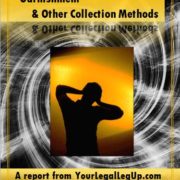Can Debt Collectors Garnish Wages or Bank Accounts?
Can Debt Collectors Garnish Your Bank Accounts or Wages? Yes. Read on to find out how to protect your rights.
Can Debt Collectors Garnish Your Bank Accounts or Wages? What Should You Do about it?
The short answer is yes – they can try, anyway.
Here are some things you need to know about garnishment.
If you have assets, and this includes either a job or money in the bank, they can be garnished if they have a judgment against you. In other words, once a debt collector has a judgment against you everything you have or may get is at risk. That’s why it’s so important to defend yourself at every step of the way.
The Surprise that Isn’t a Surprise
Lawsuits are divided into two main parts. The first part, which is what everyone thinks about in connection with “being sued,” is a determination of liability and damages (the judgment).
In plain English, a lawsuit is to decide whether you owe anything and how much. In debt cases, that’s usually determined by either a default (failing to show up to court in the first place) or a “give-up settlement” (where you show up to agree to anything the debt collector wants, which often includes a “consent judgment”).
In either case, the judgment just says you owe x-amount of dollars, or nothing if you succeed in fighting the case.
In most cases, judgments are not “self-enforcing.” That means that after the debt collector gets a judgment that you owe some money, it must still either persuade you to give it to them or find it and take it away from you. This is called “enforcing a judgment.” To do that, the debt collector tries to find your assets and then goes to the court’s garnishment office and starts garnishment proceedings.
The garnishment office does NOT tell you they’re at work, and neither does the debt collector. They want you to forget about the case and get comfortable. If you move or hide your assets, their job gets much, much tougher. (A word to the wise.) And if they warn you they are at work, you’re more likely to move or hide the assets, right?
Incredibly, people are quite often shocked when the debt collector starts seizing assets, freezing bank accounts, or garnishing assets.
They are at Work
Let this be your warning. If the debt collector has a judgment against you, THEY ARE AT WORK EVEN IF YOU AREN’T HEARING THEM. They still want your money, and they’ve taken a big and somewhat expensive first step by suing you. Why would they stop? You may forget about it, but they won’t.
The Way Garnishment Happens
You are always the last to know when collection activity happens. This way your funds are frozen before you can take any action such as withdrawing all your funds.
Banks
The debt collector serves a notice of garnishment on the bank, and as of the time the bank receives it, your account will be frozen. Their notifying the bank and not you is perfectly legal.
You typically receive the notice (including your rights) well after your funds have been frozen. In most states, the garnishment does not only freeze funds already in your account at the time of service on the financial institution, but can get money you put in afterwards for a period of time.
During the time the garnishment is in effect, the financial institution will not honor checks or other orders for the payment of money drawn against your account if it would leave a balance under the amount stated on the garnishment. For most people, this means that all your checks will bounce or be returned for NSF (non-sufficient funds) and you will be charged a hefty fee by both the bank and, possibly, by the person who tried to cash the check.
When the amount being garnished is paid, the freeze on your account must be terminated, but since many people do not have nearly enough money in their accounts to offset any significant judgment, this is not of practical significance. It is a fact, though, and if you manage to pay off the debt, plus their massive fees of course, they have to give you what’s called a “satisfaction of judgment” that ends all collection efforts.
If they catch you by surprise, you probably have big trouble. Not only is your money gone, but checks (and automatic drafts, for example) are bouncing right and left – and there are other laws that punish you for that. Therefore, if you let them get a judgment and garnish your bank, you could have a lot of trouble all the sudden. Don’t underestimate how terrible this can be.
Jobs
Wages can also be garnished, and, again, your first notice that you are being garnished is likely to be when you receive a check that is less than you thought it would be.
Federal law limits the maximum amount that can be garnished by one or more garnishment orders to 25 percent of your disposable earnings for that week, or the amount by which your disposable earnings for that week exceed thirty times the Federal minimum hourly wage, whichever is less.
In practical terms, that means (as of this writing) that if you make $154.50 or more per week your wages will be reduced by about 25%. Since most people being sued for debt are already close to the line, a 25% reduction in their paychecks can be simply devastating. And remember, you won’t find out about it until the money you expected is not there.
What can you do about all this?
Don’t Let them Get a Judgment
All of the above means that you should work HARD to avoid letting the debt collector get a judgment. If they do manage to get one, you should EXPECT NOT ONE SHRED OF MERCY. They will take every penny they can with no concern at all for the consequences to you or your family.
You Have Some Rights if they Garnish
There are some limits to what they can take from your bank account even if they have a judgment. These are determined by state law, so we don’t discuss them here. If you get a notice of garnishment, what physically happens is that the bank “holds” your money for some period of time, usually 30 days. During that time you can assert your rights and maybe make them give you some of it back. Normally the notice of garnishment tells you where to find your state law rights, but if it doesn’t, just google the question “what are my rights against garnishment in X state” to get you started. Those rights can save you a lot of grief.
Fight the Law Suit – Don’t let them Garnish your Money
Sometimes people think things are so hopeless that it isn’t worth it to try to keep them from getting a judgment. You have nothing now for them to garnish, and you don’t expect ever to have enough for them to garnish. That’s called being “judgment proof.” Or they think that no matter what they do, they’ll lose if they try to defend themselves.
Don’t go there. Things could get better for you in any number of ways, from your job suddenly turning better, to people you don’t know dying or giving you money, or you getting some sort of great idea, or… just anything. The world is full of possibilities, and good things could happen. They’re much more likely to happen if you keep looking for them, too.
As for your chances, nothing is guaranteed, and in my opinion the deck is, in fact, stacked against you. However, you still have a very good chance of winning most of the time if you know what you’re doing. Debt collectors are not built to fight long law suits – they’re designed to shake the tree and collect whatever falls most easily. If you fight, they’ll often eventually quit, and even if they don’t you have a good chance of winning. And of course that’s why we’re here. You should fight the lawsuit whether you have money or not.
Don’t Ignore the Possibility of Losing Even if you Defend
Of course, if you’re being sued there’s always a chance you could lose. ALWAYS A CHANCE.
That means that you need to keep personal information about jobs and assets out of the hands of the debt collectors whenever possible.
If you have ever written a check to the company who is the alleged original creditor, you must assume that the debt collector has your banking information. You might want to change banks.
Remember that garnishments are served on people (including corporations and banks), not accounts, so it doesn’t do any good to cancel your account and get a new one in the same bank. But changing banks will go a long way to keep you from finding out, one day, that your bank account has been emptied and your checks are now bouncing.
For a lot of people it’s harder to change jobs. I’m just saying that if you do, it will be harder for the debt collector to garnish your wages. If they have any reason to know where your present job is, you should expect them to come for it.
Your Legal Leg Up
We are dedicated to helping people defend themselves from debt lawsuits without having to hire a lawyer. Lawsuits have a number of points where specific action is called or, and we have products to help you deal with most of these situations. Your best deal is by far a membership which gets you all our downloadable products for free and also invites you to our teleconferences. Teleconferences are designed to answer, in real time, questions you ask, to discuss strategies and tactics. They help you know what the other side is up to and potential actions you can take to stop them.
In addition to that, our website is a resource for all. Many of the articles and materials are reserved for members, but many others are available to everyone. Every page has a site search button in both the header and footer. Put in a key word – a word you think relates to what you’re looking for – and enter. You will get a page of results.
Sign Up for Free Information
You can sign up to receive information from us by clicking on this link and following the instructions: https://yourlegallegup.com/blog/sign-up-for-free-information/
What you’ll receive if you sign up is a series of several videos and articles spread out over several days, and then you will occasionally hear from us as we add information to the site. We don’t always announce that information, though.
What you will not receive is any marketing from other people – or much from us, either. Our goal is to make the site more useful to members and visitors, not to swamp anyone with sales materials. The information we send will have links to information or products that we think may be helpful.





